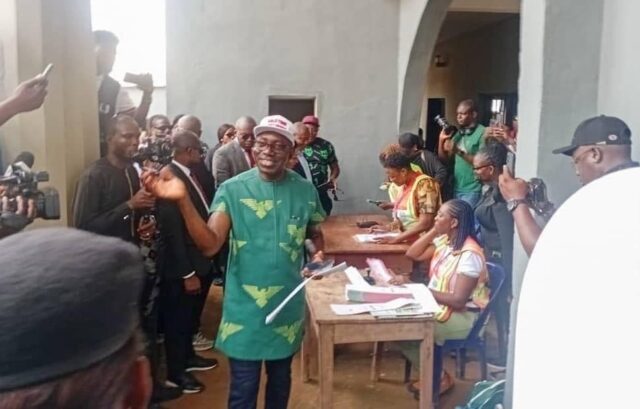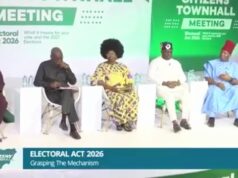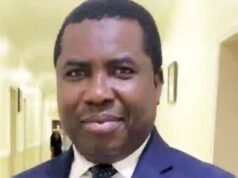By Editor
The Centre for Democracy and Development (CDD-West Africa) has said that despite some improvements on the last Saturday’s off-cycle governorship election in Anambra State, some age-long challenges still persists.
This is contained in the CDD-West Africa 2025 Anambra Governorship post-election report.
It was jointly signed by Dr. Dauda Garuba and Prof. Victor Adetula, the CDD-West Africa Director and Chair, CDD-West Africa Election Analysis Centre (CDD-EAC) respectively.
The centre noted that low voter participation and widespread vote buying in the election reflect deeper governance challenges in Nigeria, deserving lasting solutions.
TheTimes had earlier reported that the Independent National Electoral Commission (INEC) declared Charles Soludo of the All Progressives Grand Alliance (APGA) winner of the Saturday, November 8 governorship election in Anambra State.
Prof Edoma Omoregie, Returning Officer of the election, who is also the Vice Chancellor of the University of Benin, made the declaration at the INEC collation centre in Awka, the state capital, on Sunday morning.
According to the result, Soludo polled 422,664 votes while Nicholas Ukachukwu of the All Progressives Congress, trailed with 99,445 votes.
Also, George Moghalu of the Labour Party (LP) placed third with 10,576 votes, while Jude Ezenwafor of the Peoples Democratic Party (PDP) secured 1401 votes to come in at a distant fourth.
The CDD-West Africa said that the 2025 Anambra Governorship Election shows that Nigeria’s electoral challenges are deeply linked to wider governance failures, weak institutions, elite dominance, economic hardship, insecurity, and lack of accountability, which continue to shape voter behavior and electoral outcomes.
The CDD-EAC report said that in completing their initial assessment, recognise both the relative progress made and the challenges encountered by stakeholders during this eventful electoral process.
“With INEC’s claim of 98.8%, PVC collection rate, a 99.62% result upload on the IREV and a generally peaceful election environment, INEC made significant progress. These successes are commendable. However, 5.4% of polling units experienced notable delays, with INEC officials arriving late.
“CDD observed that political parties did not do enough to mobilise voters across the state. The campaign period was marked by low visibility and an absence of issue-based campaigns, which contributed significantly to the lack of competitiveness observed during the election, as noted in our previous reports,” the report said.
On security environment of the election, the report noted that over 45,000 security personnel were deployed for the election, as security personnel were present at 87.3% of polling units observed by CDD-EAC, while 12.7% recorded no security presence.
It said, “The massive deployment of security personnel ensured that the election was largely peaceful. This situation, however, raises an urgent question: what happens to flashpoint communities after the security is withdrawn and life returns to the status quo?”
It also said that vote buying was widespread and openly practised in several LGAs in the full glare of security personnel and party agents offered cash or used digital transfer methods to influence voters. Amounts ranged from N2,000 to N10,000 per voter.
“This is becoming a persistent feature of Nigeria’s elections. For political actors, vote buying remains the most predictable strategy in the absence of issue-based campaigning and the delivery of good governance,” the report said.
On information disorder during the election, it said that CDD tracked over 200 claims related to the 2025 Anambra governorship election, of which 45 were deemed fact-checkable and most relevant to the electoral process.
Analysis revealed that 54% of these claims were false, 27% were true, while 10% were misleading; and the remaining claims fell into other categories requiring context or clarification.
It said, “Political party candidates, INEC, and security personnel were among the targets of disinformation in the election. Disinformation actors weaponised insecurity and deployed hate speech and artificial intelligence to distort facts about the election process and manipulate public perception.”
The report among others recommended that the ongoing electoral reforms must target improving INEC’s operational capacity through timely funding, decentralised planning, and consistent communication.
It said that such operational issues include logistics, mandatory real-time result publication via IReV, early voting for essential personnel and adequate personnel training.
“Ongoing reforms of the electoral act must take into consideration the need to arrest and prosecute electoral offenders.
“As the country prepares for the 2026 off-cycle elections and the 2027 general elections, these reforms must be prioritised. Nigeria’s democratic survival depends not just on voting but on the strength of the institutions and the governance practices that surround it,” the report said.
Discover more from TheTimes Nigeria
Subscribe to get the latest posts sent to your email.








